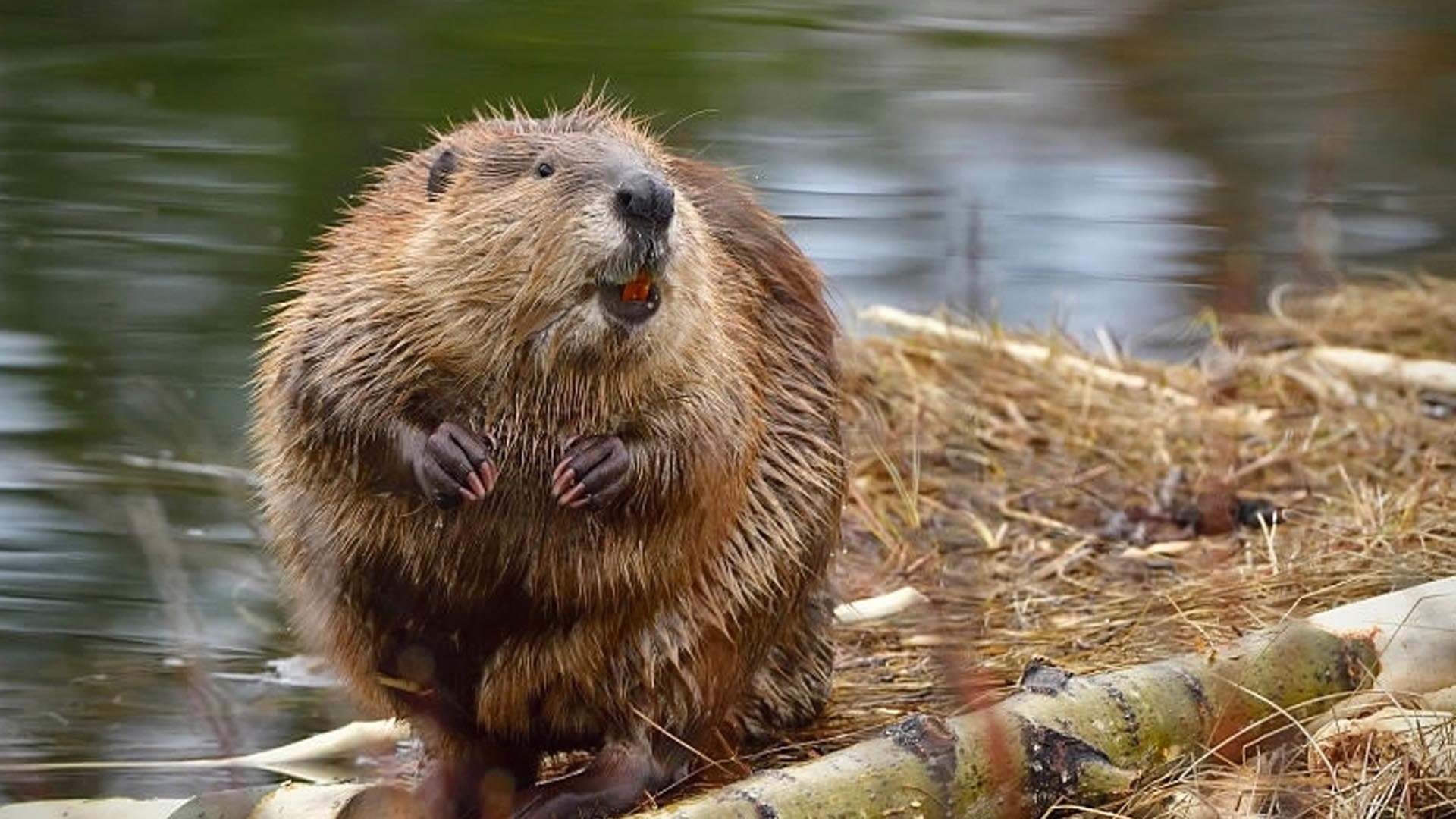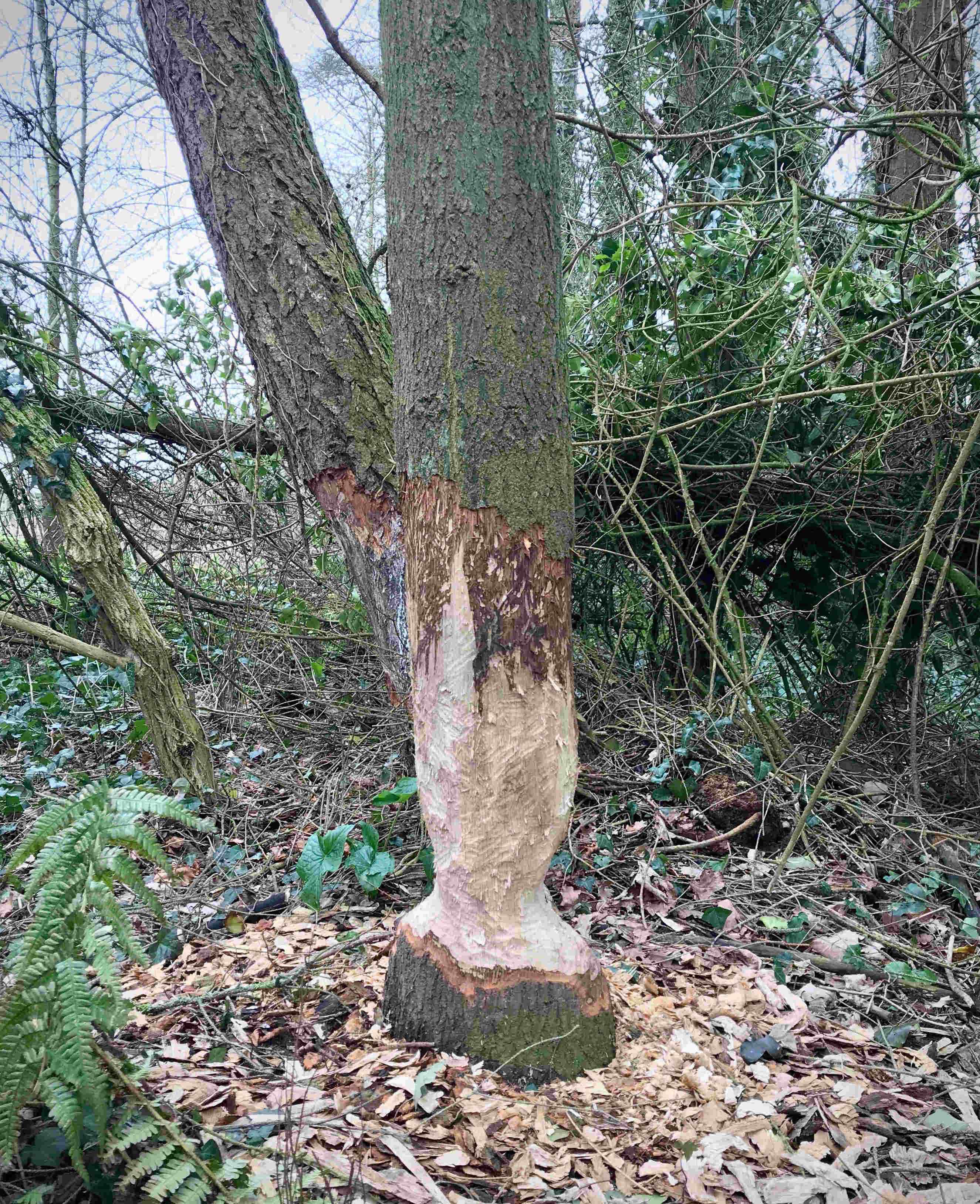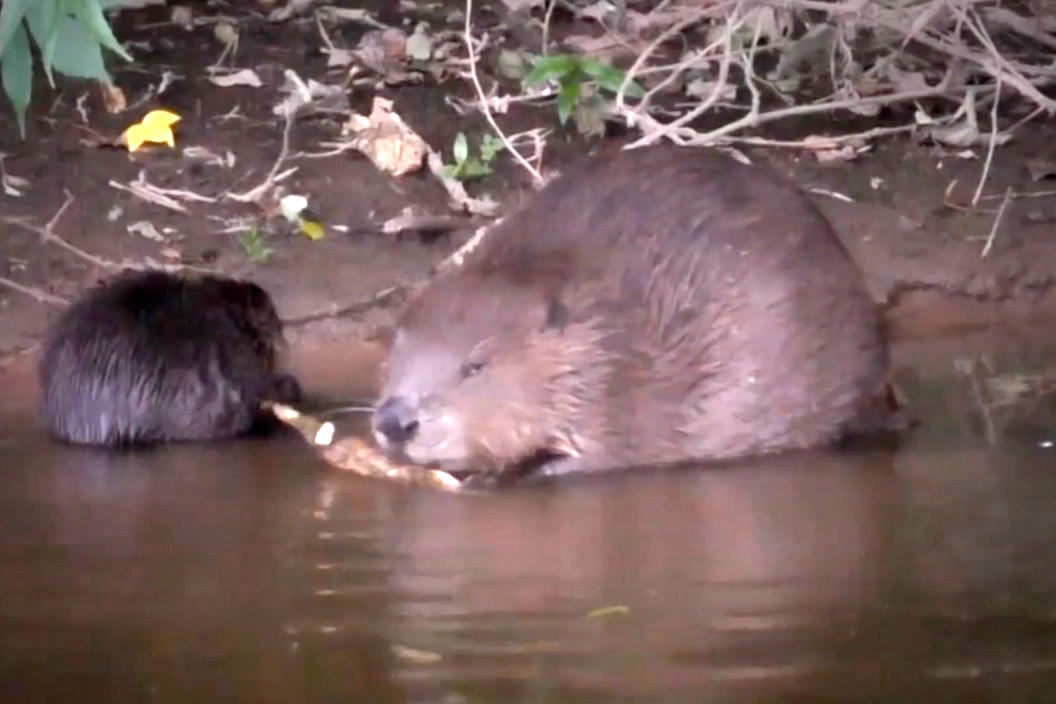
Animal
09:59, 29-Mar-2018
Bringing the beaver back to Great Britain
By Kate Parkinson

With one eye on the dark clouds in the sky and the other on the muddy puddles and wet grass we trudged across fields and clambered over gates until we got to the beaver site – a three-hectare plot of land, contained behind a 12-volt electrified fence.
Seven years ago this patch of woodland has just a small trickle of a stream running through it but it has been completely transformed by a family of beavers who’ve been, well, as busy beavers.

A beaver dam on the River Otter in Devon /CGTN Photo
A beaver dam on the River Otter in Devon /CGTN Photo
Since moving in, the industrious rodents have spent their days toppling trees, excavating channels, and rapidly building dams to create deep water canals and pools.

This land used to just have a small trickle of a stream but the beavers have created 13 ponds with their dams. /CGTN Photo
This land used to just have a small trickle of a stream but the beavers have created 13 ponds with their dams. /CGTN Photo
Mark Elliot, who leads the beaver project for Devon Wildlife Trust, said the way the beavers have engineered the landscape has been remarkable and the new habitat is providing a perfect opportunity to study the impact that beavers have on the environment.
He said the beavers are already proving that they could be used as natural flood defenses. Researchers from the University of Exeter have been monitoring the amount of water entering, being stored within, and leaving the site and have found that the beaver dams are significantly slowing the flow of water. “If beavers are placed at the top of a river catchment it could dramatically reduce the chance of flooding in downstream areas,” Elliot explained.
The research has also shown that the beaver activity is improving water quality and boosting biodiversity. “The story so far has been overwhelmingly positive,” said Elliot. But not everyone shares his views about beavers.

Mark Elliot runs the Devon Wildlife Trust Beaver Project. /CGTN Photo
Mark Elliot runs the Devon Wildlife Trust Beaver Project. /CGTN Photo
Although a native species beavers were hunted to extinction in the United Kingdom over 400 years ago and some are not convinced that they should be brought back. Farmers are among those leading the anti-beaver campaign. The National Farmers Union says that beavers released into the wild in Scotland have caused widespread damage and dozens have been shot by angry landowners.
The Devon beavers are causing less controversy because they’re in an enclosed space. But in 2013, the Devon Wildlife Trust’s beaver project was suddenly expanded when a family of beavers were spotted living in the wild.
As we strolled along the banks of the River Otter, retired environmental scientist Tom Buckley explained that he found some peculiar markings on a tree near the water to set up a camera to investigate. What he captured was extraordinary, images of what is believed to be England’s only wild beaver colony. "I couldn’t believe it,” he told me, "I was almost speechless.”
It is still a mystery how the family of beavers got there. They may have escaped from captivity, or one theory is that they were put there by "beaver bombers" – wildlife vigilantes who illegally release animals into the wild.
Either way, the government did not share Buckley’s excitement and made plans to capture the beavers, test them for disease and then re-home them in captivity.

Beavers have powerful teeth and can gnaw their way through large trees. /CGTN Photo
Beavers have powerful teeth and can gnaw their way through large trees. /CGTN Photo
For a while the wild beavers were the center of a fierce debate. Buckley plastered shop windows around town with signs that read "Save Our Beavers,” and urged people to sign a petition. Conservationists launched legal action to try and prevent the government from capturing the beavers.
It worked – after months of wrangling the government announced the beavers could stay and granted Devon Wildlife Trust a five-year license to manage a beaver reintroduction pilot project.
Elliot said a big part of his job is working with local farmers.
“Beavers do create issues, there's no two ways about it,” he said. "They are not marauding across farms causing damage but they do engineer water and they could change the way we drain land.” But so far he’s not found any dissenting voices. "Most have been brilliant. We’re not seeing any persecution of beavers on the river at all,” he said.
The River Otter beavers are thriving in the wild. There are thought to be around 27 living along the river now, in nine different family groups. Despite the initial lukewarm reception, the beavers seem to be winning over authorities. This spring four beavers will be released into an enclosure in Gloucestershire. The scheme will be the first of its kind on government land and the beavers have one job – to stop flooding.

England’s only colony of wild beavers live along the River Otter in Devon. /Photo from Tom Buckley
England’s only colony of wild beavers live along the River Otter in Devon. /Photo from Tom Buckley
Environment Minister, Michal Gove, said locals have strongly backed the new scheme having suffered terrible flooding in recent years that devastated their homes and businesses. Gove described beavers as "nature’s engineers, architects, builders and plumbers,” adding, "We know from similar schemes in Devon that a single family of beavers is capable of holding back enough water to help alleviate the risk of further flooding in a way that is both sustainable and cost-effective.”
Sadly I didn’t see any beavers during my trip to Devon. Beavers are crepuscular, emerging primarily at dawn and dusk, so the winter months are not the best time for beaver spotting. But in the summer, when the evenings are long, wildlife watchers have a good chance of spotting a beaver, or two, beavering away on the banks of the River Otter in Devon.
Background Information
- Beavers are large semi-aquatic rodents.
- Beavers can hold their breath while underwater for up to 15 mins.
- Beavers are completely vegetarian.
- In the wild, beavers can live for up to 15 years.
- Beavers mate for life and live in family groups.
- Beavers are a native species to UK but were hunted to extinction for their fur and their scent glands which were used in medicine and perfume.
- Beavers have a reputation for being very industrious which is where the expression “as busy as a beaver” comes from.
- Beavers can hold their breath while underwater for up to 15 mins.
- Beavers are completely vegetarian.
- In the wild, beavers can live for up to 15 years.
- Beavers mate for life and live in family groups.
- Beavers are a native species to UK but were hunted to extinction for their fur and their scent glands which were used in medicine and perfume.
- Beavers have a reputation for being very industrious which is where the expression “as busy as a beaver” comes from.

SITEMAP
Copyright © 2018 CGTN. Beijing ICP prepared NO.16065310-3
Copyright © 2018 CGTN. Beijing ICP prepared NO.16065310-3